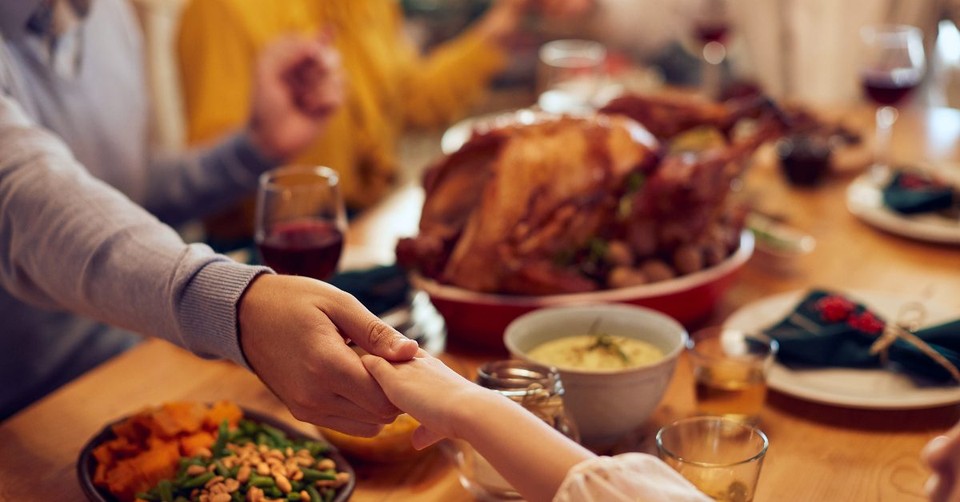How to Host a Christ-Centered Thanksgiving

The extended family Thanksgiving table can make for the worst of times, or the best of times. At its worst, this appointed day of gratitude turns into a gripe-and-groan session. The whole situation can be somewhat amusing or downright infuriating. We shouldn’t be so surprised. After all, for many families, Thanksgiving is a rare meal that brings together a collection of family members who don’t normally keep company.
Given the inherent challenges, how can we make the most of the extended family Thanksgiving table?
As a pastor, I encourage you to view the Thanksgiving dinner table as if it were a Bible-era feast, especially if you are the host. You might be surprised, but this approach will likely be welcomed by your entire family. Here’s what I mean.
How Biblical Feasting Changes the Heart of the Host
When I approach the Thanksgiving dinner table as a biblical feast, it changes the disposition of my heart and the frame of my mind in three ways.
First, a biblical feast approach alters my focus. The whole point of biblical feasts was to help the people of God decenter themselves and recenter God. Consider the Passover Feast, in which Israel focused like a laser on remembering how God had delivered them from Egypt (Exod. 12-13). If I’m focusing on God’s goodness through Christ, I will be grateful for the dinner’s positive moments and relatively unfazed by any negative moments that may arise.
Second, when I view the Thanksgiving table as a biblical feast, I just might end up expanding my guest list and generously invite others to the table. Consider the biblical accounts of Jesus’ meals: he purposely expanded the guest list to include people quite different from him—for example, sinners and tax collectors (Luke 5:30). Imagine what our Thanksgiving dinners would look like if we invited people who otherwise would dine alone: international students from the local college, singles from our church, and widows from the local nursing home. Doing so can be a game-changer: suddenly the dinner is expansive and generous rather than insular and self-centered.
Third, a biblical feast approach keeps things in perspective. Think about it in terms of the local church’s communal feast, the Lord’s Supper: it’s a preview of the marriage supper of the Lamb (Rev. 19). When we partake of the bread and wine, we get a little taste—during this sin-ridden and painful era before Christ’s return—of the feasting and fellowshipping we will experience in the new heavens and earth. By way of analogy, as a Thanksgiving host, when I keep one eye on that future feast and its perfect ideal, I won’t be so bothered by the imperfections and flaws evident at the extended family table.
How Biblical Feasting Shapes Our Interactions Around the Table
With the biblical feast as our model, we will find many ways to honor Christ and show hospitality around the Thanksgiving dinner table.
As the sun rises and we begin preparations for the day, we will reflect on the many ways God has been good to us and our family. Thanksgiving Day is the perfect time to read and meditate on Scripture passages that detail God’s love, provision, and protection (e.g., Josh. 1:9; 1 John 4:9-10); place a framed prayer or decorative Scripture card at the center of the room; and invite guests who would otherwise spend the holiday alone (Heb. 13:2).
As our guests arrive, we will keep Christ at the center by putting gratitude into action. A Thanksgiving dinner party is the ideal time to tell loved ones and guests what we appreciate about them; take every opportunity to serve our guests; and share aloud what we are thankful for, directing our gratitude to specific people but, more ultimately, to Christ. We must determine to make the most of every moment, speaking out of a heart of humility and gratitude at every turn.
Let the Blessings Flow
The biblical feast reminds us to let the blessings flow. As God has blessed us, so we bless others. As believers, we will one day gather to enjoy a great feast with Christ our Lord. We will join that celebration and participate in its worship. Until then, we feast in the here and now, tolerating the challenges that come with a sin-ridden world. Thus, we focus on God rather than ourselves, thank God for his gifts and others for their presence, and enjoy our meal with the expectation of that day when we will dine with God himself.
Photo Credit: ©iStock/Getty Images Plus/Drazen Zigic
Dr. Robert J. Pacienza is Senior Pastor of Coral Ridge Presbyterian Church, President of Coral Ridge Ministries and Founder of the Institute for Faith & Culture.
Originally published November 11, 2025.







